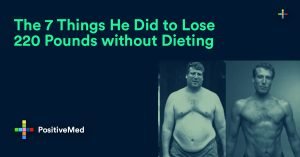
26 Bad Habits That Lead to Weight Gain
A wise woman once said that if you are in a hole, stop digging! So why do most of us keep digging when it comes to our weight? To be sure, indulging every so often is not the issue. So go for the banana split. The real issue is what we do habitually. These seemingly minor behaviors can add up, and take our waste lines in the right direction or down the wrong track. That little changes can make a big difference is great news. We’ve come up with 26 ways that extra weight can creep up on us if we are not mindful. Attend to just one or two of these ideas each day and you will notice astonishing improvement!

1. You don’t eat breakfast
It may seem counterintuitive, but skipping breakfast actually makes you gain weight. Two things happen when you skip breakfast. First, your hunger goes up. Second, your metabolic rate – how fast your body turns food into energy – goes down. So when you do eat, you overcompensate for the skipped breakfast, and your body is diverting those extra calories into fat.
2. You are the Roadrunner of meals
Meep meep! Indeed. Eating quickly short-circuits the lines of communication from your stomach to your brain. You may have eaten enough, but it takes about 20 minutes for your stomach to send that signal to your brain. By scarfing down your meal, you run the risk of overeating.
3. You fiend for diet soda
It’s true that diet soda has fewer calories than regular soda. However, artificial sweeteners in diet soda may increase your appetite. Studies comparing groups of diet soda drinkers to non-drinkers find that the drinkers gain significantly more weight than nondrinkers.
4. You have abnormal sleep habits
Studies show that people getting less than five or more than nine hours of sleep each night have difficulty losing weight.
5. You turn your back on dietary knowledge
It turns out that when people receive exercise and nutritional advice, they make healthier choices than people who do not receive such advice. So you are off to a great start by reading this article.
6. Low fat is not always your friend
The issue is that when fat gets taken out, it must be replaced with something else. Often, that something is carbohydrates, and often, carbs are worse than fat! Extra carbs cause our blood sugar to spike. When we fall back to earth, we are hungry again, so we eat more. Eating healthy fats is actually good for you and makes you feel full.
7. You keep getting refills on the tortillas, breadsticks, and curly fries
We all know that those bottomless snacks at restaurants – the pre-appetizer appetizers – are hard to resist. But they are highly caloric and may prevent you from eating your intended (and probably healthier) meal.
8. You supersize it
We all know that these fast-food chains are out to make money. When they call something a “value” meal, they mean value for their business, not your health. Go a la carte, leave extra calories behind, and be intentional about your meals.
9. You are stressed out
Occasional, acute stress is no big deal. On the other hand, chronic stress – from an unsupportive boss, or an unsupportive partner, for example – is a problem worth addressing. A chronically stressed-out person will have trouble sleeping, get sick more often, and gain weight. So make a plan for attaining a lifestyle in which you have a strong support network.
10. You are a diet zealot
We get it, you are hardcore. That’s awesome and we love you for it. But consider that being healthy is a marathon, not a sprint. Cutting out all carbs or all salt might bring you results at the beginning, but do you really think such a habit is sustainable? Change does not happen overnight. Be patient and you will astound yourself.
RELATED ARTICLE: Sustainable Habits That Create A Healthy Lifestyle In 21 Days Or Less
11. You worship your television
Research subjects who cut their viewing time by half burned an extra 119 calories each day. So listen to the radio, or watch TV while spinning.
12. How something was cooked does not concern you
A meal can sound healthy, but if it contains trans fats, then it is not. Ask whether a meal contains partially hydrogenated or hydrogenated vegetable oil. If it does, request that an un-hydrogenated oil be used instead. Non-hydrogenated oils include olive oil, sunflower oil, safflower oil, and canola oil.
13. Your portions are too large
Quinoa is very healthy, but we don’t mean that it should be your main course every night. Balance out your plate with copious vegetables and some lean protein.
14. You are vitamin D deficient
Having a vitamin D level that is too low is extremely common, and it puts you at risk for cancer, heart disease, osteoporosis, and depression. You can easily have your vitamin D checked with a blood test, and over-the-counter (or prescription) supplements are widely available.
15. You maintain a line-of-site with the assets at all times
It turns out the obese diners are more likely than non-obese diners to choose a seat facing the buffet. So next time you dine buffet-style, put your back to the buffet and take your eyes off the prize.
16. You’re eating zero fat and throwing the baby out with the bathwater
It is true that certain fats (trans fats) are unhealthy, causing cardiovascular disease and weight gain. However, some fats are healthy. You can find healthy fats in olive oil, almonds, walnuts, avocado, nuts, and flax seeds. In addition, these fats help us feel full, so we eat fewer calories.
17. You ignore your scale
Measure your weight loss progress! These measurements will strengthen your resolve and remind you every day of your goals.
18. Your dishes are huge
Bigger plates mean bigger portions. Get smaller dishes!
19. You eat salty snacks with abandon
Salt is everywhere in the food we eat, and most Americans consume too much of it. Pay attention to your salt intake, and reduce your risk of bloating and high blood pressure. The American Heart Association recommends consuming 1500 milligrams of sodium per day, or less.
20. You put the whole meal on the table and keep it there
It’s best to serve a meal from the kitchen so that diners are not tempted to keep helping themselves.
21. You neglect your H2O intake
Scientists at the University of Utah found that subjects who drank two cups of water prior to meals lost 30% more weight than their counterparts who did not. A German study found that people can boost their metabolism by drinking six cups of water each day.
22. You kick it with unhealthy pals
People with obese friends are more likely to be obese. Rather than ditch your friend, attempt to renegotiate the terms of the relationship by suggesting you go running together, sign up for a fitness class, or participate in a food co-op. If she refuses to change, then find people who share your new interests.
23. You habitually use food as therapy
If you are deal with stress by eating, you might feel better temporarily, but you are not doing yourself any favors. One does not forget bad habits overnight, but one can learn new habits in a few weeks. Condition yourself to respond constructively to stress – take a walk, drink some water, or chew some gum. The point is to substitute a neutral or positive behavior for a negative behavior – rather than attempting to quit the negative habit cold-turkey.
24. Fruit flavor is not the same as fruit
Selling syrup-based “fruity” drinks may be good for a restaurant’s margin, but it’s bad for everything else. Steer clear of the corn syrup and choose either a drink made from blended, unsugared fruit or some red wine.
25. You postpone lunch
Studies show that when we delay eating while we are hungry, our cortisol levels rise and our metabolism slows. So make a point of eating when your are hungry.
26. You ignore your body
It’s easy to get caught up in the demands of the day-to-day. What can get lost is the messages coming from your body, and neglecting them is a mistake. Give yourself time to rest and digest. You’ll become a more positive presence, and someone who takes care of herself radiates beauty.
You now have a well-equipped weight-loss arsenal. The plans-of-attack available to you are numerous. Everybody starts somewhere. So where are you starting, personally? Please share with us in the comments! Where are you now? What is your goal for tomorrow? What is your goal for this week? This month?





